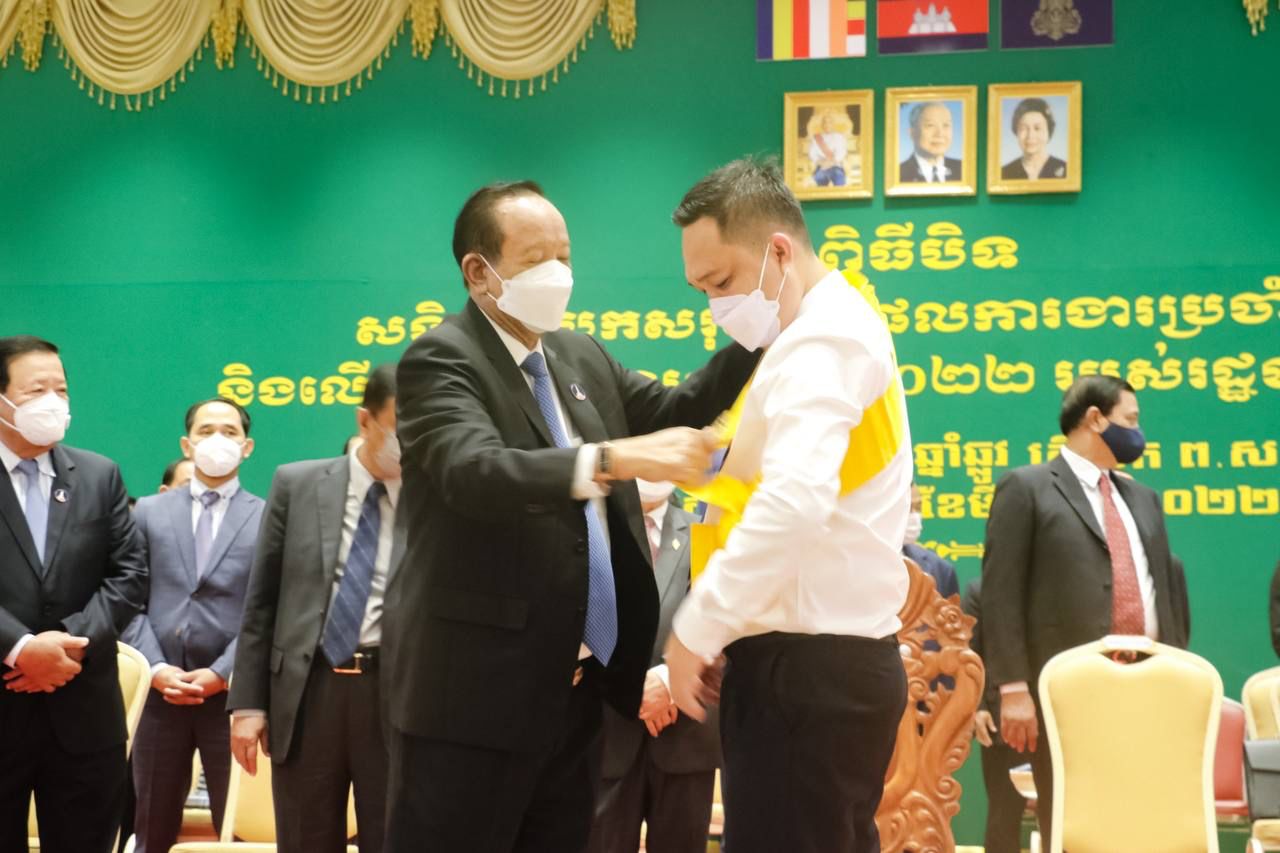
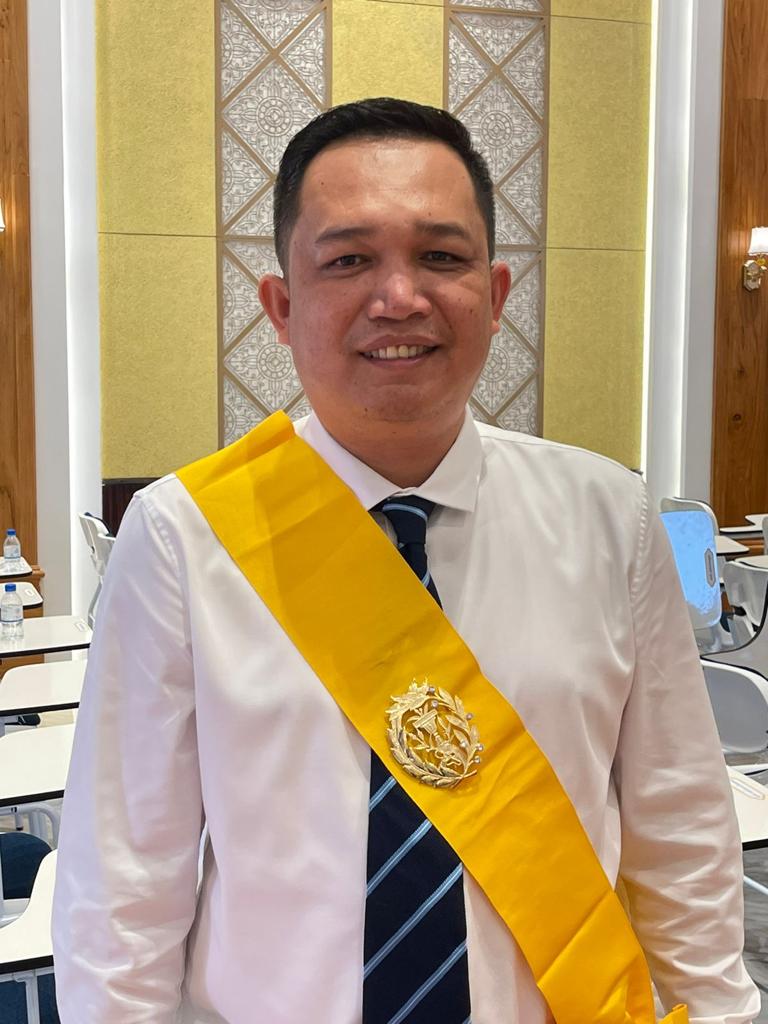
“collaboration and support showcased during the construction phase are commendable.”
Manjeet Raj Pandey, UWS Global Advisor for Building and Construction.
As per the baseline data, Malarani has 69 children of primary education age, and 27 children are overage for primary school, among which 48 and 13 are out-of-school children, respectively. Poor road access to other schools and lack of a primary school in the village meant that either a child walked to faraway schools, moved away or did not participate in education.
Seeing UWS Hile, a UWS school nearby, and how it transformed the access to quality education in Hile, the Malarani villagers became keen to open a UWS school in their community. And that is how the school came into existence.
UWS Malarani has 8 classrooms constructed for grades ECD through 5 and a library. It also has disabled and gender-friendly sanitation facilities constructed to maintain school sanitation. The education team expects to enrol around 70 students in the first cohort.
Let us take this moment to appreciate the different members across UWS Nepal and Global teams who have made it possible for us to reach this “50 School Milestone!”
You will hear from Ramila Singh; Senior Finance Officer for UWS Nepal, Chenda Mony; Education Officer for UWS Cambodia, Sovy Thann; UWKindergarten Officer for UWS Cambodia, and female staff members from UWS Myanmar, whose identities have been protected due to the ongoing political situation in Myanmar.
Here are the voices of just some of the women that choose to challenge gender inequality every day through their work at United World Schools. Thank you to every single teacher, education officer, community member, staff member and volunteer who champions female education and gender equality every day across United World Schools and beyond.
WHICH FEMALE ROLE MODELS INSPIRED YOU, OR CONTINUE TO INSPIRE YOU TO WORK FOR GENDER EQUALITY?
I was very lucky to be born in a family where the leading role was played by my mom because my father used to be mostly out stationed due to work. During this phase my mom used to always inspire me to develop myself and think about how I can contribute to the community in future. This is the reason I became a big believer of saying, “If you want to Make a Change, Be the Change”.
- Ramila Singh, UWS Nepal
HOW HAVE YOU OVERCOME OBSTACLES IN YOUR LIFE TO INSPIRE OTHERS?
Chenda Mony, UWS Cambodia: In my school age, I went against my family and people in the village to continue going to school till I finished high school; then I continued to university at which I supported myself by having a job while still at university. This experience is what I use to inspire other women and younger females, to remind them that we have the right to achieve and set any goal we want in life, that we can decide when and who to marry, and then we also have the right to do business or work to bring another source of income in the family.
Sovy Thann, UWS Cambodia:
When I first started working, I had faced many discrimination for my work and my voice was not seriously considered and valued. Despite this challenge, I continue to encourage myself to keep working hard. Today, I feel better because this challenge is fading away, because the system has changed. We have a wider education campaign that promotes women’s rights and gender equality across the country. In addition, there are more women in leadership roles in the government and NGOs sectors.
UWS Myanmar: From my experience, having role models at national and local levels have been identified to encourage the colleagues, friends, families, and broader communities to ensure equal participation for women and men, girls and boys in the community. The social benefits of gender equality should be explored and celebrated. Women’s participation in the decision making from family level to community level make the men reduce the burden, and help improve wellbeing for the children.
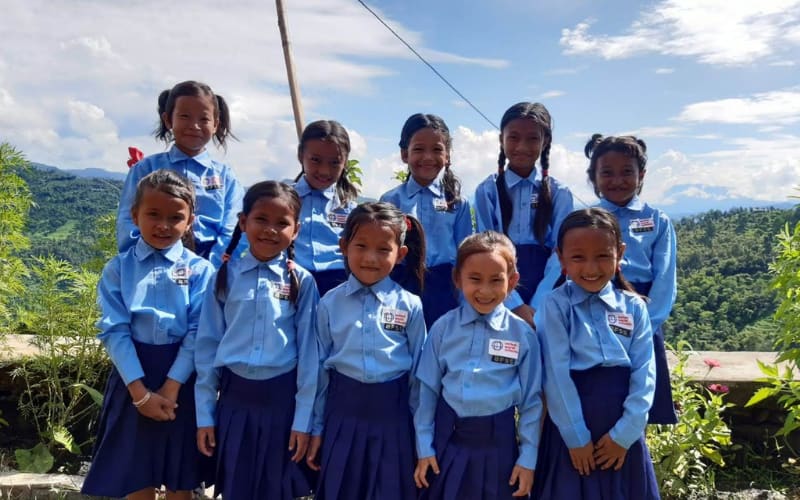
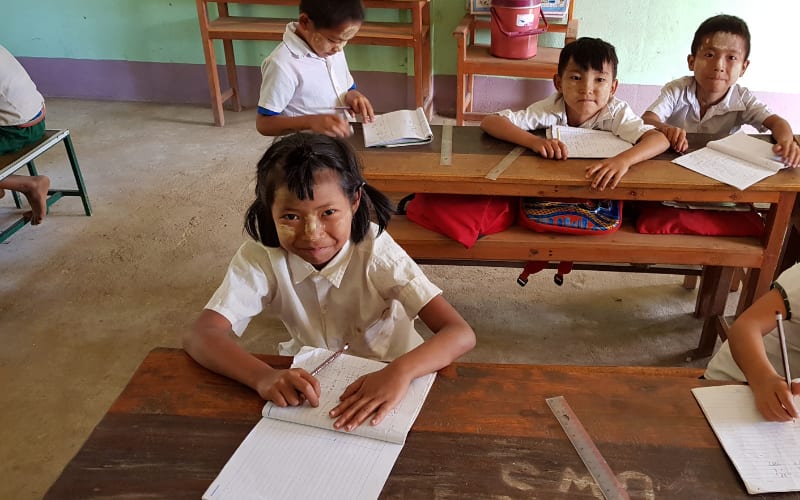
WHAT DRIVES YOU TO CHAMPION GENDER EQUALITY WITH UNITED WORLD SCHOOLS?
Ramila Singh, UWS Nepal: When you see the education scenario in Nepal it is very regressive this is why I was inspired to join UWS Nepal as this is dedicated to educating children especially girls. Once I started working in UWS I felt blessed to be working in an organization that truly practices the concept of women empowerment as well as hears what the employees say and value their feedback and contributions.
Although I am blessed to have such a wonderful team, it’s very sad that I cannot say the same for other working women in Nepal. If you see in the context of Nepal, High Girl Illiteracy Level and Women Workplace Inequality are the major issues in Community today so to help in solving these issues I have also been involved voluntarily with other NGOs that practice Women Empowerment and Community Development.
Chenda Mony, UWS Cambodia: The factor that inspires me to drive social change and support organisations like UWS is that I see the importance and value of education that UWS has brought to the communities so far. I think empowering women is very important because we are training to increase human resources in every generation to change perspectives. Since I started working for UWS, I see that most of UWS work is also focusing on women and girls, that is when I feel even more committed to work in the education sector.
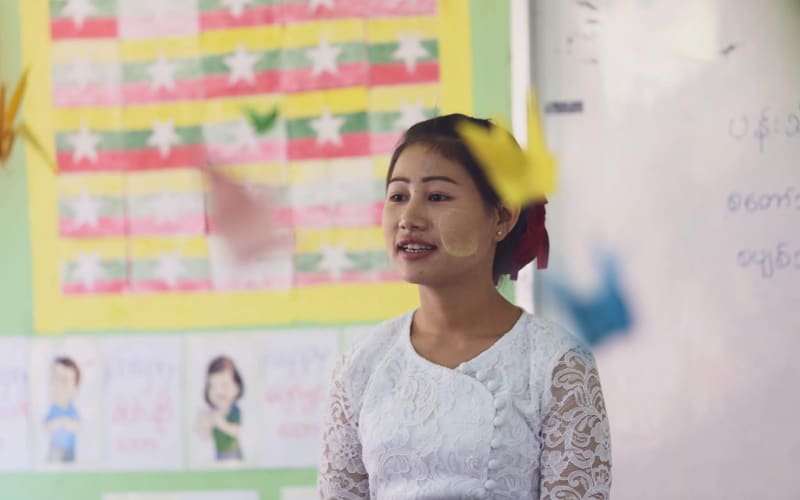
WHAT ARE THE BIGGEST CHALLENGES THAT WOMEN AND GIRLS ARE FACING IN YOUR COMMUNITY TODAY?
Sovy Thann, UWS Cambodia:
Younger girls are facing a big challenge nowadays due to their family economic situation. In the past, most families did their farming close to the villages. But now these farms are sold to the outsiders, thus they have gone to clear the forest that is really far away from the village. Often, families would spend their time there. This is a challenge for young girls to come to school from the farm because it is relatively unsafe to be on the road.
UWS Myanmar: There are still widespread beliefs across the country and among different religious and ethnic groups. And the cultural norm acts as a barrier to the realization of women’s rights.
Cultural norms impact heavily on women’s opportunities for health, education and ownership of property. Such norms include: women’s menstruation is dirty; women are for reproductive work, housework and care to children; encourage women to sacrifice themselves for their families; and position women as inferior to men in the household. In ethnic culture (i.e Chin ethnic), women are not allowed to inherit all their parent property even if she is the only one child in the family. One of her father’s brothers would inherit the major property. Furthermore, according to the marriage cultural norm to maintain life-long marriage, women are held to endure the violence of the husband.
United World Schools is wholeheartedly committed to challenging gender inequality in every facet of our work, and the passion and commitment of our female colleagues and community members is essential to achieving our mission. To find out more about how we champion gender equality in the communities we work in, and across our organisation, read our inclusion policy.
1. BELIEVE.
If there is one overriding feature that has driven UWS’ success in the last ten years it is an unwavering, complete and utter belief in the mission; and linking up with partners and colleagues who share total commitment to the power of education to transform lives. Reflecting recently with a number of our donors, the belief in the UWS mission is universal, and perhaps the biggest driver of our success.
2. KNOW WHO YOU ARE AND WHY YOU ARE HERE.
Ever since the first UWS Community School in the remote village of Kong Nork, Cambodia was established in 2009, we’ve been clear on what we are trying to do. We’ve been prepared to innovate of course, but rarely strayed too far away from our core purpose and focus. We’ve kept it simple. As we’ve grown, we’ve also learnt the importance of saying ‘no’ to well-intended suggestions that ultimately distract the organisation from its core purpose. On reflection, we should have had the confidence to, politely, say ‘no’ earlier in our journey – this is all part of the learning experience.
3. GOALS: MAKE THEM AUDACIOUS, BIG AND BOLD.
When we launched our ‘transforming 50,000 lives’ campaign in 2014, the ambition and scale captured attention – and we successfully gained the investment and gathered momentum as a result. People either thought we were bonkers, or that we had a great idea… and wanted to work out which one it was! Fortunately, they concluded it was the latter, and we had £1m of unrestricted funding pledged to develop the organisation. We’ve never looked back.
4. CONNECT AND INVEST IN PEOPLE.
Perhaps the organisation’s biggest strength are the partnerships that have been formed, based on mutually beneficial, trusted relationships. At our best, we’ve made it more than a great cause – we’ve made people part of a family. Where we’ve stumbled, failing to properly invest in the right people, in the right way, has almost always been part of the root cause.
5. PUNCH ABOVE YOUR WEIGHT.
We’ve often acted bigger than we are (and then grown into the space created). A good example is when we secured our first major, multi-million dollar grant from one of our partners in 2016. We were tiny in comparison to many of their other partners, but we had the appetite to grow and develop. This grant was a game changer for us, and we have subsequently become a peer organisation to the very best in our sector.
6. THINK LIKE A SYSTEM, AND ACT LIKE AN ENTREPRENEUR.
Bold, audacious plans for growth and scale were essential for UWS’ success… but meaningless without a plan to deliver them. At our best, we’ve planned in a very business-like and systematic manner; when we’ve moved to action, we’ve changed leadership ‘gear’ and intentionally executed the plan as entrepreneurs – being dynamic, problem-solving and rapidly adapting to change. By doing so, we’ve scaled with ‘glocal’ behaviours: an organisation that seeks to balance appropriate country autonomy with global consistency. Our CV19 response – as well as keeping education going through temporary school closures in 2020/21, and reopening successfully recently – is perhaps one of the best examples of this.
7. KNOW YOUR NUMBERS.
A budget isn’t just a budget, it’s a plan. It costs just over a dollar per week to educate a child in a UWS Community School – this represents a terrific value and is very compelling for philanthropists. We’ve played to our strength here over the years, not just with financial transparency (which is essential), but also with clear financials giving confidence in who is running the organisation. And we’ve encouraged internal colleagues to deeply engage with our numbers – and therefore own our cost-conscious, high-impact plans.
8. TALK IT UP.
We can all choose our attitude. We’ve chosen positivity. UWS operate in difficult places – positivity has been essential to keep enthusiasm, a can-do approach and optimism. Positivity has also been infectious, motivating teams, building and sustaining organisation momentum.
9. DO SOMETHING SLIGHTLY BETTER EACH DAY.
We’ve had the opportunity to engage with some extraordinarily brilliant people on our journey. The opportunities to listen and learn have been significant, and every day as CEO, I’ve aimed to improve something. This has also empowered stakeholders around the world to continue to lean in - feeling part of the journey, and able to contribute to it.
10 MAKE SOMEONE’S DAY.
We’re in the people business. It’s a challenging and complicated business – and also deeply rewarding. Yet in our relentless pursuit of the ‘next’ goal or objectives, we perhaps haven’t always taken the time to celebrate and recognise success on route. The learning? Taking an opportunity to make someone’s day today, sets up even more success tomorrow.
“I live in Heluwabesi with my aunt and uncle. I have no idea where my mother has gone. I don’t even remember her. According to my Auntie Bhim, she left my father and went for another man, when I was just a little girl. After that, my father took me to a person in the village and asked them to look after me as he was unable to do so on his own.
One day, Auntie Bhim came to get me. At first, I didn’t want to go as I had gotten used to living with my foster family, but she said she will look after me like her own daughter. I still resisted, but she insisted and so, I went to live with her, my uncle and my little ‘sister’. My aunt helped me and bought me new clothes.''
Preeti's aunt Bhim never had the chance to go to school. She's determined that Preeti has the opportunity to learn, and follow her dreams.
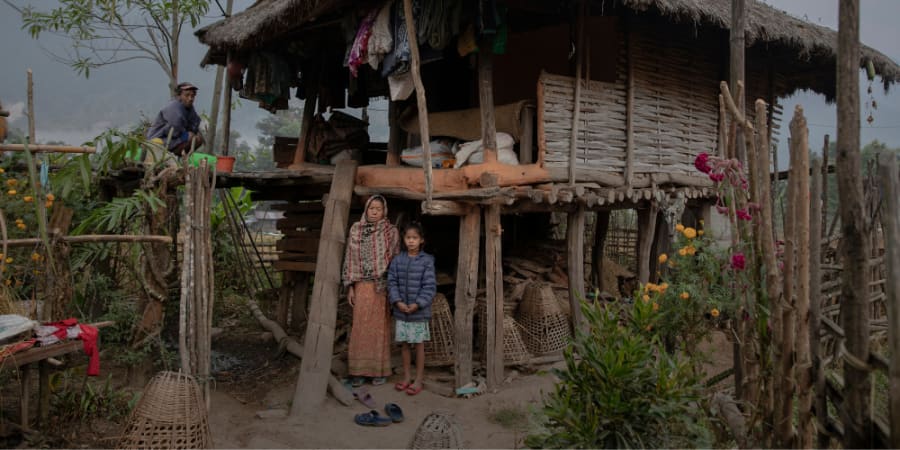
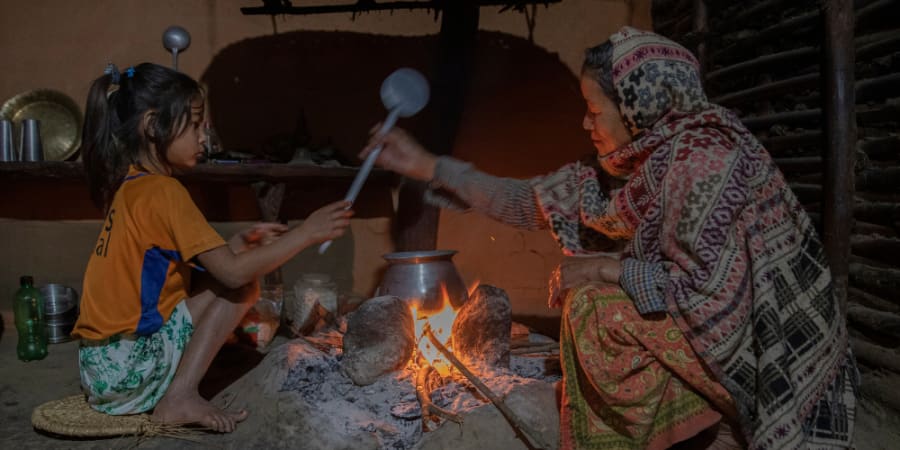
“When I was young, I wanted to go to school, but I never went because my father asked me not to go - he needed me to stay home and work. So I never went to school."
Preeti
“I worked at home; my brothers would ask me to chop firewood, it was those kinds of chores.
I believe that going to school will improve my children’s minds and I tell Preeti, my eldest niece) to study. So, as long as I am here, they get to focus on their studies.
I have hope that she can become an important person in the future. I advise her to study and not be distracted.”
As the first girl in her family to go school, Preeti has the chance to break the cycle of poverty, and to dream of something more.
”Auntie Bhim insists that I go to school every day – and it makes her happy to see me go. And I enjoy going to school. On my way I see lots of beautiful fields, but it takes a long time to get there as it’s a bit far away from our home.
I like the school environment and enjoy studying. I feel glad when our teachers let us play – I love to skip. My favourite subject is Nepali. When I grow up, I want to become a doctor. ”
Preeti’s teacher Laxmi is glad that Preeti has a chance to get an education, something that wouldn’t have been possible without the building of the school in the village.
”When I taught her Maths in class 3, I asked her to study the multiplication table of 2 and she was almost the first one to memorise the multiplication table, which proves that she has an intelligent mind. Even the top ranked students could not compete with her.”
This International Day of the Girl, help girls like Preeti to get the education that every child deserves. Donate today, and your gift will help us provide education to remote and marginalised communities, to help girls like Preeti break the cycle of poverty, and have the chance to achieve their dreams.
CHIMINI'S PENCIL CASE
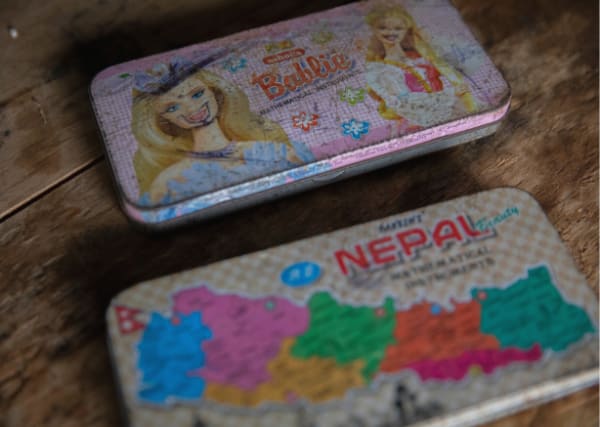
Chimini, 10, keeps her pencil cases hidden away in a room in her grandparent's shop in Mabir, Nepal.
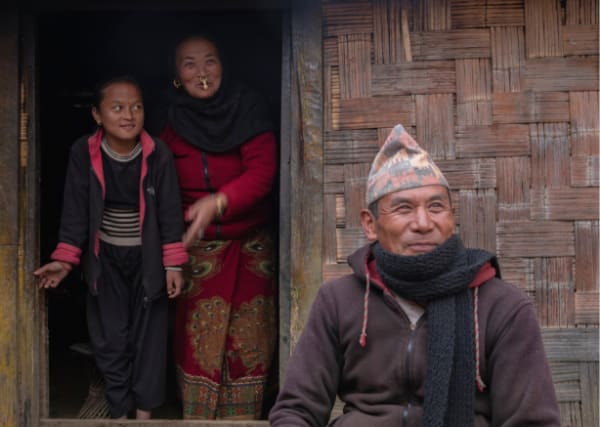
"My grandmother helps me to learn how to read and write, but I wish to go to school so I can learn even more" - Chimini
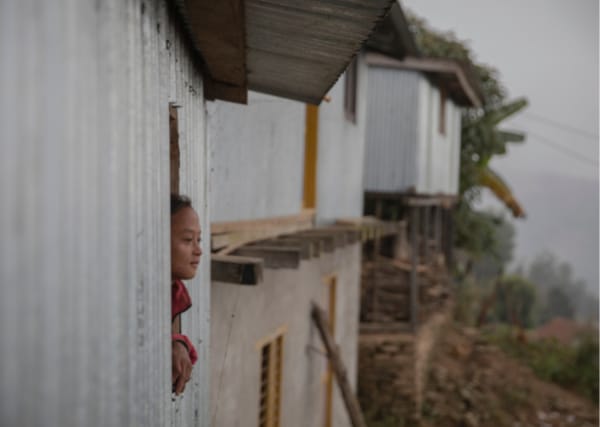
"I want to understand everything, and I want to learn to write my name." - Chimini
KANCHI'S PENCIL CASE
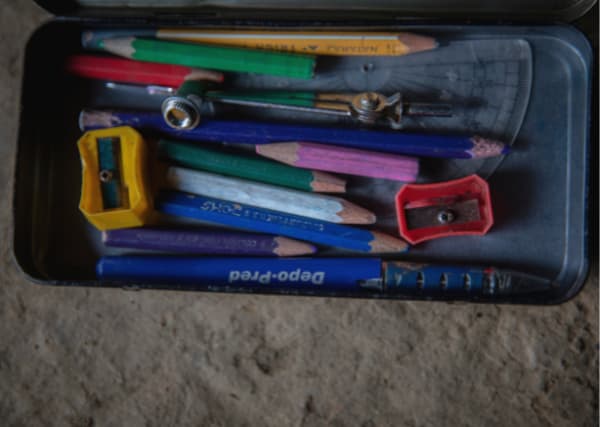
Kanchi (10) showed us the inside of her much-loved pencil case in Helabuwesi, Nepal.
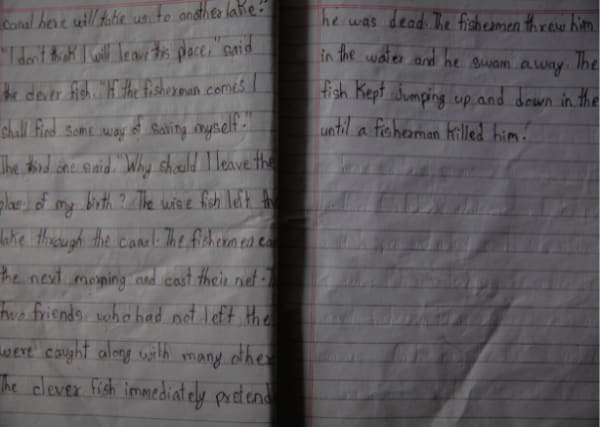
Kanchi wrote this short story about a very wise fish who escaped a fisherman's net.
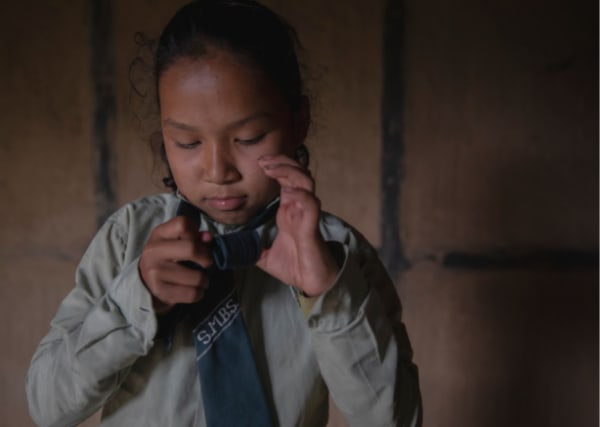
Kanchi gets ready for another day at UWS Helabuwesi School, Nepal.
AMIR'S PENCIL CASE
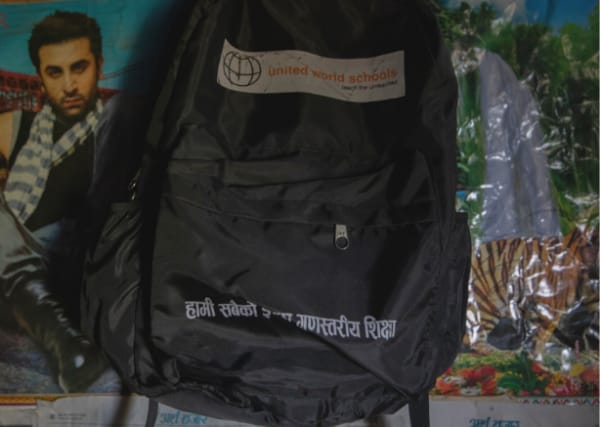
Amir (6) keeps his pencil case safely in his school bag hanging on his bedroom wall.
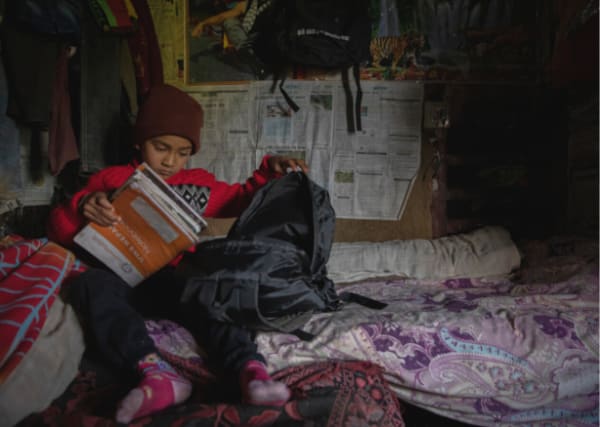
Amir packs his school bag for the day at UWS Majjuwa School, Nepal.
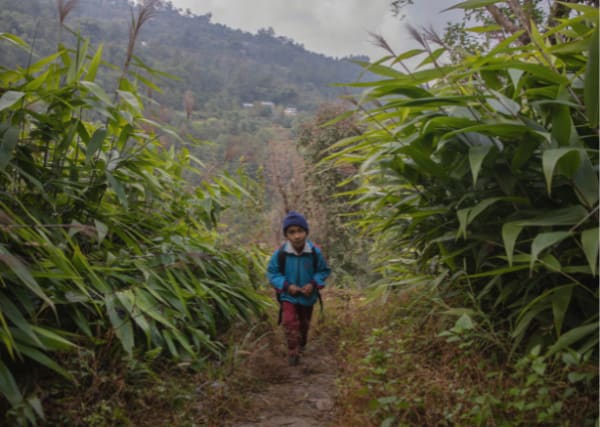
Before lockdown, Amir walked 180 minutes to school and back every day just to learn to read and write.
PREETI'S PENCIL CASE
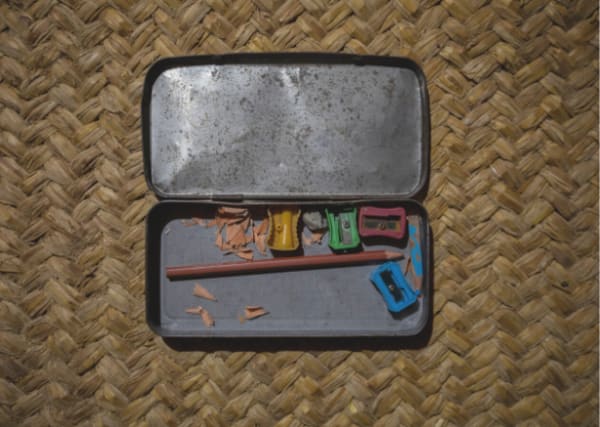
Preeti (10) shows us her pencil case which was open on her bed as she finished her homework.
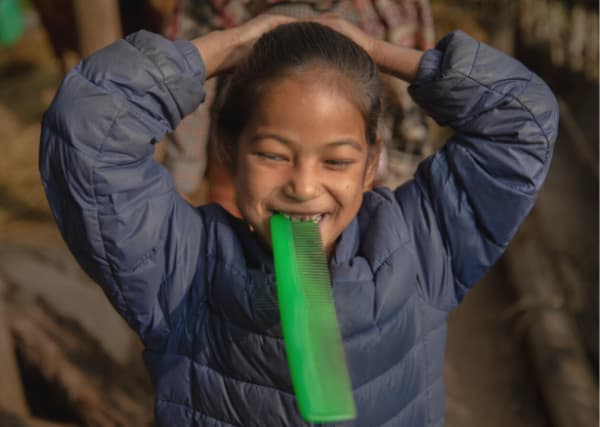
Preeti combs her hair to get ready for the day at UWS Helabuwesi School.
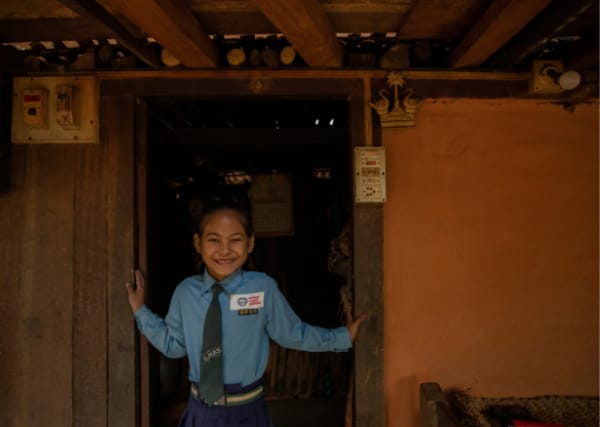
"I like the school environment and enjoy studying. I feel glad when our teachers let us play – I love to skip." - Preeti
We have to keep working to provide children from marginalised areas like Chimini, Kanchi, Amir and Preeti with the chance to read, write and learn.
HOW HAS THE PANDEMIC IMPACTED THE CHILDREN UWS SUPPORTS?
It’s important to acknowledge that all children have been affected by the pandemic. When we look at the affects on children in the UK, we see that the pandemic has had a profound impact on their wellbeing. A 2020 YouGov poll conducted on behalf of Barnado’s found that a third of the UK’s children are experiencing mental health difficulties due to lockdown.
But as with many crises, the most vulnerable around the world have been hit even harder by the effects of the pandemic. In many of the communities we work in, our schools are their first introduction to education. We’ve worked so hard alongside community leaders to make education a priority, and COVID-19 threatens to undermine that progress.
WHAT WOULD HAPPEN IF THAT EDUCATIONAL PROGRESS WAS REVERSED?
The UN has estimated that an additional 24 million children might not go back to school after the pandemic - that’s on top of the hundreds of millions of children who already don’t attend school. When children aren’t in education, they’re far more at risk of being taken advantage of, they have fewer life opportunities and even worse health outcomes. You can read more about that here.
The alternatives to education - like child labour and child marriage - are diametrically opposed to what a childhood should be. What’s lost when children don’t go back to school is not just education but also a childhood. It’s a long-term loss as well; loss in brain development, in self-esteem, in opportunities for the future. Since schools are closed in every country we work in at the moment, the risk to children is growing every day.
HOW CAN CREATIVITY AND PLAYING HELP CHILDREN GET BACK TO SCHOOL?
To get children back to school, we need to tackle inattendance on three fronts. Firstly, we need to re-build communities’ commitment to education, which we’re doing through in-country ‘back to school’ awareness campaigns. Secondly, we need to support parents and encourage them to send their children back to school, and our teachers and Education Officers like Mr Hy Sombo are hard at work doing just that.
Lastly - but certainly not least - we need to empower the children themselves to become their own biggest advocates. We do that by helping them see the benefits of education, but also by making learning fun! In many of the countries where we work, rote learning is the norm - but we incorporate child-centred learning into our classrooms and distance learning. Something as simple as the children making their own masks can be seen as ‘play’.
ONCE CHILDREN ARE BACK IN SCHOOL, WHAT ARE SOME OF THE STRUGGLES THEY FACE?
The restrictions are heart-breaking. Children need to play with each other, to touch each other, to make bonds. Play is needed more than ever, but it’s harder than ever to incorporate it into the classroom.
I don’t know who it’s harder for; the children who’ve never been to school before and are introduced to education in a very strange way, or the children who have been away from school for months due to lockdown and are coming back to a very different school environment which is much less playful and interactive than it was before.
It’s also important to remember that children experience time in a very different way to adults. For primary school aged children, they may not be capable of understanding that these restrictions won’t last forever. I’m worried about retention, and I’m worried about the kids’ wellbeing.
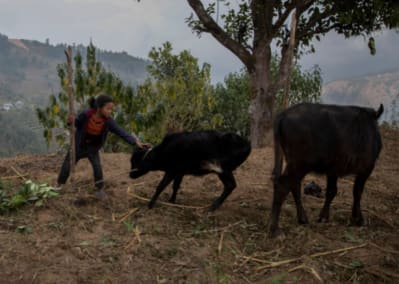
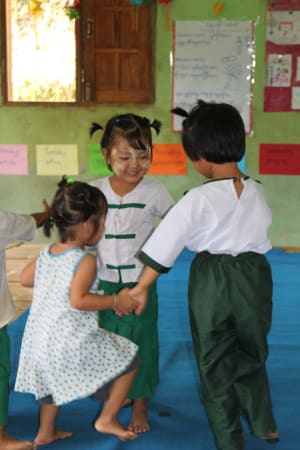
HOW CAN WE HELP IMPROVE CHILDREN’S MENTAL HEALTH?
We need to listen to children, and to promote their self-expression through art and play. The story of our Education Officer Mr Hout Veasna highlights the importance and power of creativity in the classroom.
The LEGO Foundation, one of UWS’ biggest supporters and champions of learning through play, have also developed many resources for educators and primary caregivers to draw upon, such as their free online course, Coping with Changes: Social-Emotional Learning Through Play.
WHAT’S YOUR VISION FOR THE FUTURE?
I can’t lie, I’d like to see children get back to tumbling over each other in a playground!
I think one of the positive things to come out of this crisis is that the sector and the world are appreciating schools more now; parents are desperate to get their kids back to school and governments are doing everything they can to re-open schools as quickly as possible. There’s a renewed understanding of the importance of education, and the fact that schools are central to a thriving society.
“If you don't know part of my early history, I emigrated from Burma with my family when I was five. I can only imagine it was a tough decision as we left almost all of our family behind; the many aunts, cousins and both sets of grandparents. But we also left behind a ruling dictatorship which couldn't understand the harsh economic realities of normal people, with little investment in healthcare or education (instead, spending most of their revenue on arming the military). If my father hadn’t made that decision all those years ago my life would be very different.
One of my first Skillshare classes I created was around creative goals and if you have also seen my recent Skillshare class, Transition Into Illustration: Breaking into the Industry, you will know that I am a firm believer in having a vision of how I wanted my illustration career to look like in order to shape it. Way back in 2012 even before I picked up a brush or pen, I created a goals book of how I wanted my ideal life, with a thriving illustration business, including the types of clients I’d attract.
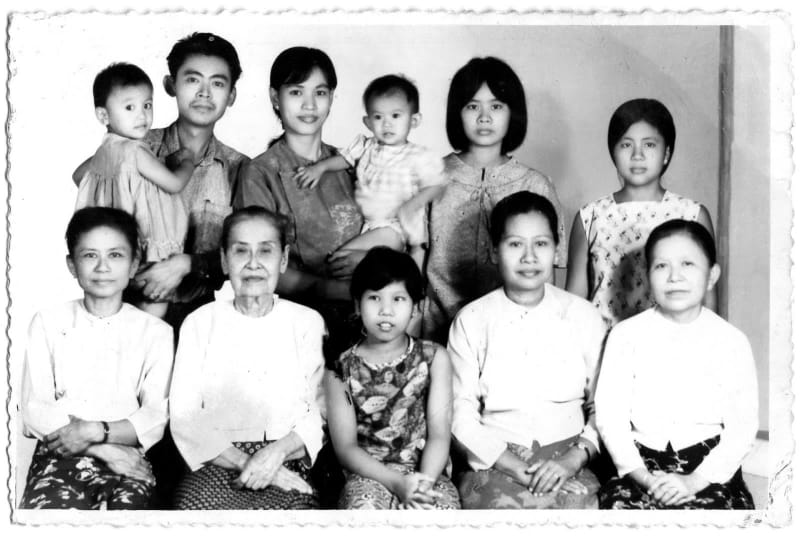
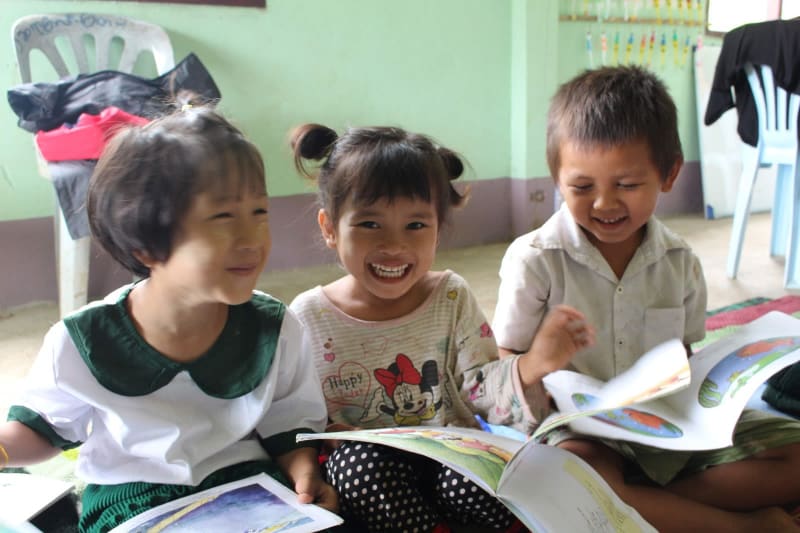
Coming from a disadvantaged background, I knew I wanted to work with charities in order to help others less fortunate than myself. I knew how incredibly lucky and privileged I was to have had access to good healthcare and education as an immigrant to the UK. If I had stayed in Burma I would not have had such opportunities or security. Over the years I have supported many charities to help with sanitation, the fight against malaria, and bringing clean water to remote communities. From my position today I wish for all children to have enough to eat, an education, and their own hopes and goals for the future which is not blighted by poverty.
This July, I am delighted to be teaming up with United World Schools (UWS) to help the world's most remote and marginalised regions to give every child access to free education. They partner with local communities in Myanmar, Nepal and Cambodia, to build, equip and resource primary schools. The charity aims to break the cycle of illiteracy in one generation across Asia, empowering children to realise their full potential and build a better future - for them and their families.
I first met the team from UWS at a charity fundraising event for Burma and I was immediately taken by their commitment to bring education to remote communities including those in Burma. I talked to them about a slip of paper I’d placed in my ‘magic jam jar’ with my wish to work with children's charities.
I’m honoured to join other amazing illustrators such as Axel Scheffler, Jackie Morris, Emily Gravett, Debi Gliori and more to take part in UWS Happily Ever Smarter Secret Sale, by sharing an illustration based on a real life story of one of the incredible children they are working to support, high in the Himalayas in Nepal.
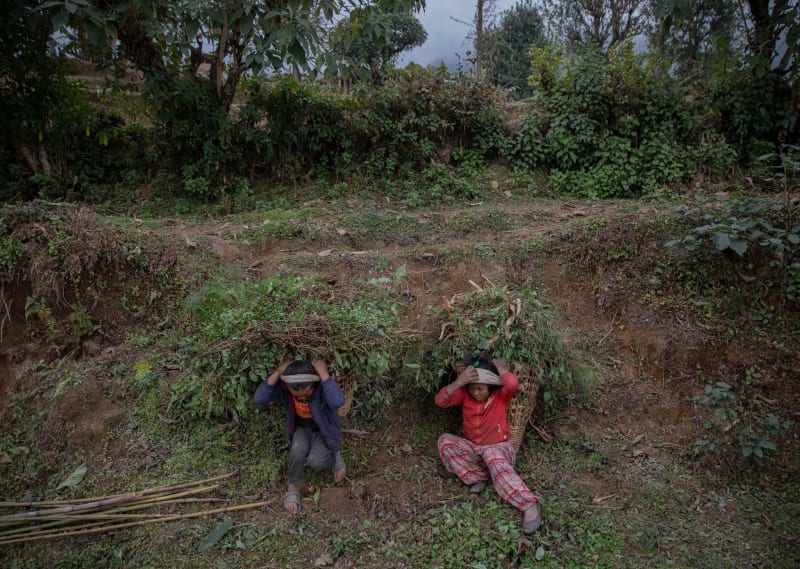
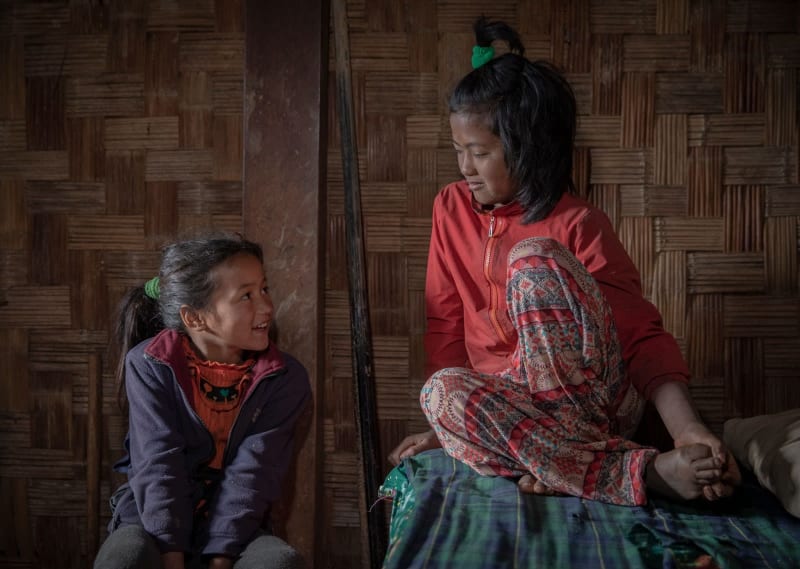
This is the piece I created based on an 11 year old girl called Soneeya (pictured above with her sister, Heena) who wishes she didn't have to carry loads of grass every morning and would love to be at school instead of looking after the cattle all day. She deserves a chance to become a teacher and help her village when she’s older.
For me, or my children or Soneeya, goals even in their simplest form can provide us with a strong motivation that can keep you going for months and years, and can be transformative.”
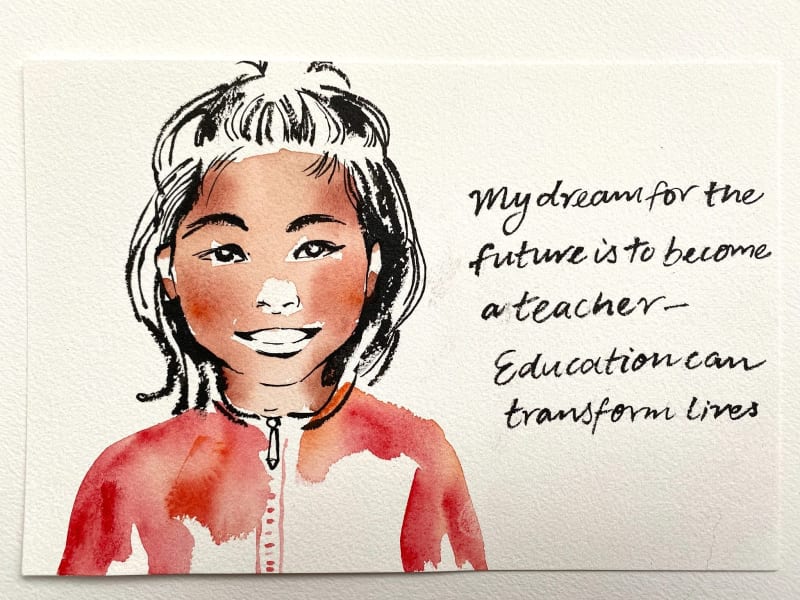
Thank you to Ohn Mar Win for writing this inspiring blog and illustrating a beautiful piece inspired by Soneeya’s story as part of our Happily Ever Smarter Secret Sale.
Running until 29 July, our Secret Sale offers an exciting opportunity to win an original artwork by one of the UK's most treasured illustrators - and help more children to live ‘Happily Ever Smarter’.
One in six children worldwide do not have the chance to attend school and in the remote areas where UWS works less than a third of children complete primary education. Schools are often so far away that it’s dangerous for young children to walk there and there isn’t always an understanding of the importance of education. Children are often needed to work in the fields and at home, keeping them trapped in a cycle of poverty.
Covid-19 has exacerbated this education crisis. Pupils at Scarisbrick Hall School know only too well how hard it has been to learn during the pandemic, but for children in extremely remote areas with no technology it’s been almost impossible.
“I missed school and seeing my friends over lock-down and we were lucky to have our lessons take place on Teams so when I heard about these children who have no technology and have to walk for over an hour to get to school when it is open, it makes me feel very lucky."
Eddie, 11, pupil at Scarisbrick Hall
“As a school we have all enjoyed running and knowing that the money we’ve raised can go a long way to help the school children in Asia. For Happily Ever Smarter we’ve challenged our pupils to run to Cambodia – it’s 4200 miles, so on average each pupil has to run 9 miles. We want them to use this opportunity to get their body moving, do things out in the fresh air and understand the value of what giving a small amount of money can actually do to transform another child’s life.”
“We’re delighted with how our pupils have engaged with Happily Ever Smarter and the work that UWS do in some of the most remote places in the world. They get a real insight into the barriers to education and how thousands of children in remote areas have many challenges just to complete a basic primary education. And we’re delighted that we’ve now raised £13,963!”
All donations to Happily Ever Smarter until 29 July are being doubled by the UK government which means that the money raised by Scarisbrick School amounts to £27,926 – enough to support education for 349 children for an entire year!
Happily Ever Smarter has produced a cutting edge animated film to tell the story of Kanchi*, 10, who lives high in the Himalayan mountains in Nepal, working all day in the fields with her grandmother and dreams of going to school. As the film turns from beautiful animation to stunning live action footage we see Kanchi’s dreams turn into reality, as a school is built in her remote village. Kanchi sets off for her first day of school and a chance to transform her future. Actor Amanda Redman (New Tricks, At Home with the Braithwaites and Good Karma Hospital) is adding her support to the appeal and has recorded the voice-over.
Award-winning charity United World Schools (UWS) aims to raise £2 million with Happily Ever Smarter to build, resource and equip 70 new schools, train 375 local people as community teachers and reach 10,000 more children, like Kanchi, with education.
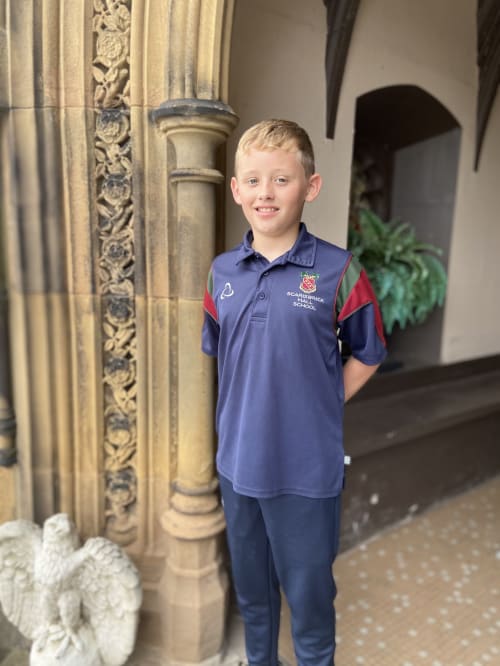
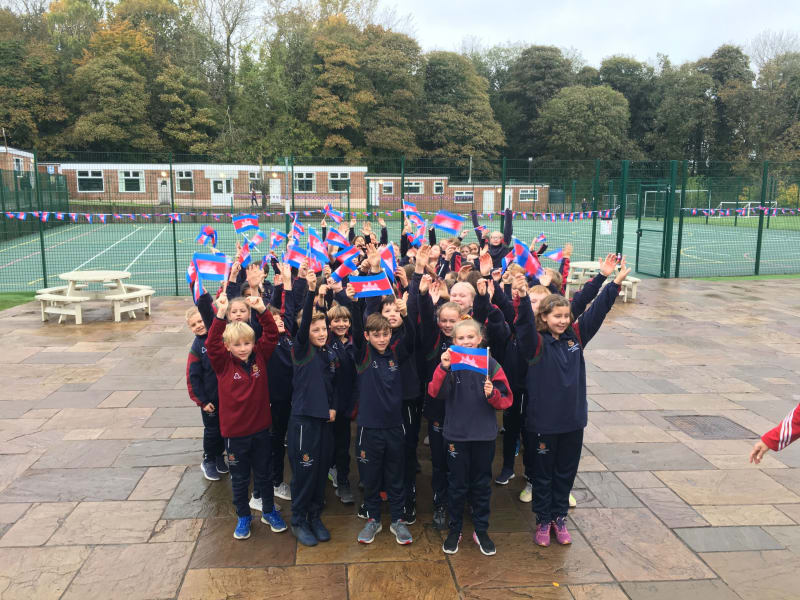
Kanchi's Story
Tim Howarth, CEO of United World Schools, said: “In the remote areas where we work there are thousands of children who have no school to attend. For children who miss out on education the future can look extremely bleak. Girls are particularly vulnerable to exploitation through child labour and early marriage.
“We’ve already reached 43,000 children with our life-changing education model, by developing schools, investing in local communities and innovating our programmes. We’re so proud of the work that Scarisbrick School is doing to help us reach many more children and give them the education they deserve.”
Donate to help children live #HappilyEverSmarter before 29th July 2021 and the UK government will double your donations. £80 could provide education for a year for one child ...and doubled, we could educate two children! To find out more and donate visit www.unitedworldschools.org
Notes to Editors:
Scarisbrick Hall School media contact:
Suzie Walmsley
[email protected] | 01704 842240
UWS media contact - for more information, spokespeople, content and imagery:
Karen Garvin
[email protected] | 07971 576917
Kanchi selection of images and first-person story *Kanchi’s name has been changed to protect her identity. (More stories and images available). Photo credit: Navesh Chitraker.
UK Aid Match and Happily Ever Smarter logos
UK Aid Match campaign - From 29 April to 29 July 2021 for every £1 you give to United World Schools the UK government will match your donation by giving another £1. All donations will help children from very remote communities access education across Asia. UK government funding will go to UWS’ programmes in Nepal to help over 8,000 out of school children in some of the most remote areas go to primary school for the very first time. Donations from the British public will be spent across all UWS’ education programmes in Nepal, Cambodia and Myanmar.
United World Schools (UWS) builds schools in some of the most remote, impoverished villages in the world and champions inclusive, innovative and sustainable education, including remote learning during the Covid-19 pandemic. Since 2008, UWS has built 250 schools and trained 1,000 local and government teachers and reached 43,000 children in Nepal, Myanmar and Cambodia with a life-changing education. UWS is a 2019 WISE Award Winner for educational innovation, and a 2020 UNESCO King Sejong Literacy Prize winner for ethnic minority literacy programmes.
Global Education Facts and Figures
Out of school figures:
- 258 million children were already out of school before the coronavirus pandemic struck (UNESCO 2019). This includes: 59 million children of primary school age, 62 million of lower secondary school age and 138 million of upper secondary age.
- 18.7 million children are out of school in Asia (UNESCO 2019).
Covid-19 impact:
- School closures amid the pandemic have compounded the already dire progress on Sustainable Development Goal 4 (SDG4) - the global commitment to guaranteeing a quality education for every child by 2030.
- 24 million children may never go back to school (UN, Oct 2020) after the pandemic, falling victim to early marriage or a lifetime of poverty. Vital progress made in access to education worldwide will be pushed back by a decade.
- UNESCO has warned that it may be six years until 2018 levels of education financing are reached again, resulting in lost learning for millions of children (UNESCO 2020).
Education benefits:
- For each additional year of schooling, an individual’s income increases by up to 10%. If all students in low income countries acquired basic reading skills, 171 million people could be lifted out of poverty. (EFA GMR 2014)
- The pandemic has shone a spotlight on the importance of global healthcare and access to health information. Education is inextricably linked to health and the benefits are lifelong. A child whose mother can read is 50% more likely to live past the age of 5 and 50% more likely to be immunised.
- For the world’s most marginalised children, school not only builds opportunities for the future, but is also a place of safety and a centre for life-protecting and and growth of social and life skills. For example UWS works to instill hygiene practices at the schools it works in.
What is the education system in Nepal?
Nepal is one of the poorest countries in the world, with an economy largely dependent on aid and tourism. As a result, government investment in education has been limited, tending only to reach communities based along main roads. However, many remote villages can’t be reached by road. This means that thousands of children from remote and marginalised communities are excluded from education. There are 101,223 children out of school in Nepal (UNESCO, 2017) with many children dropping out before they complete their primary education (retention rate 73.6% - UNESCO, 2016).
Our Happily Ever Smarter campaign will be providing education for children in the regions of Gulmi, Sankhuwasabha, Taplejung, Morang and Chitwan and Rupandehi Districts of Nepal, where it is estimated that there are more than 67,530 children of primary-school-age out of school. Across these regions, less than a third of the population completes primary education, and the vast majority of those who do are from urban areas.
United World Schools (UWS) has been working in the Sankhuwasabha, [an area affected by the Civil War in Nepal 1996-2006] and Gulmi Districts since 2016. During this time, we have supported over 35 communities to access education and have been recognised at a regional level for our successes. We also plan to start supporting communities in areas like Chitwan, where marginalized groups like the Muslims, Musahar and Tharu have been deprived of education.
Although Nepal has made progress in terms of access to education in recent years, very few of these improvements have reached remote and marginalised regions.
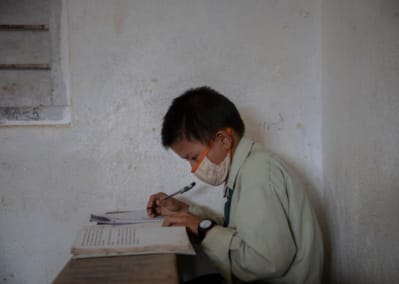
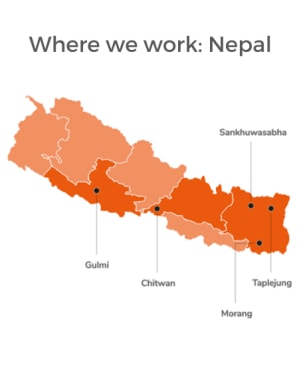
An education crisis in rural Nepal
In rural, remote areas of Nepal, as few as 10% of the population are able to read and write. Schools are often so far away that it’s dangerous for primary-school-age children to walk there, and there isn’t always an understanding of the importance of education in their communities. In poorer communities, children often work in the home or the fields to help make ends meet, which can keep them trapped in a preventable cycle of poverty and illiteracy.
"It makes me very tired cutting the grass," says 11-year-old Soneeya (pictured). "I feel happy to now see the [UWS] school being built in my village. I'll be so glad to study rather than working."
Covid-19 has exacerbated this education crisis, making it even harder to reach these children. We all know how difficult it’s been for children here in the UK to learn during the pandemic; but for children in extremely remote areas with no technology, it has been almost impossible.
Despite these challenges, our incredible teams in Nepal, Cambodia and Myanmar worked hard to reach 148,000 people with essential information about coronavirus and advice on how to prevent the spread. Our distance learning programmes reached over 40,000 children including lessons delivered via loudspeaker and radio. However, the culture of education in many areas is new and fragile. The UN estimates that 24 million children worldwide may never return to school after the pandemic, falling victim to early marriage or a lifetime of poverty.
Children from remote, ethnic minority communities are disproportionately affected - especially girls, many of whom have never had the chance to go to school. The girls who do attend school are at higher risk of dropping out by the time they reach their teens, due to the risk of child marriage and social stigma surrounding menstruation. According to data from the Nepal Demographic and Health Survey, 40% of girls in Nepal are married before they turn 18 - and this figure is likely to be higher in rural areas.
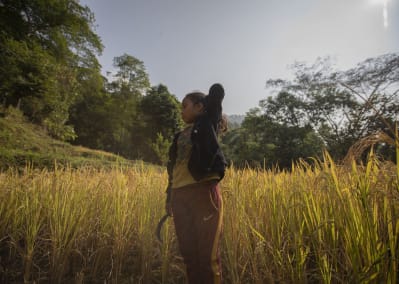
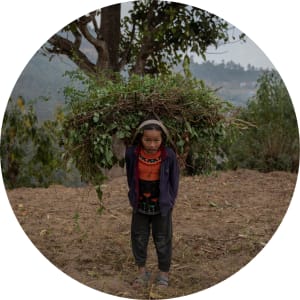
Changing the story for children in rural Nepal
At United World Schools, we’re working to transform children’s futures and entire communities in Nepal and across Asia through our life-changing education model. Through building schools and investing in local communities, we will help thousands of primary-school-age children into education.
We train local teachers, empower students and parents, provide health and sanitation support and partner with regional and national governments. We provide ongoing support until every school is self-sustaining and we are confident in the local authority’s ability to maintain it - meaning that each school will continue to provide a life-changing education for generations to come.
In just 12 years, United World Schools has transformed hundreds of communities and thousands of children’s lives. We’ve reached 43,000 children in Nepal, Myanmar and Cambodia with a life-changing education - and with your support, we can help even more children live Happily Ever Smarter.
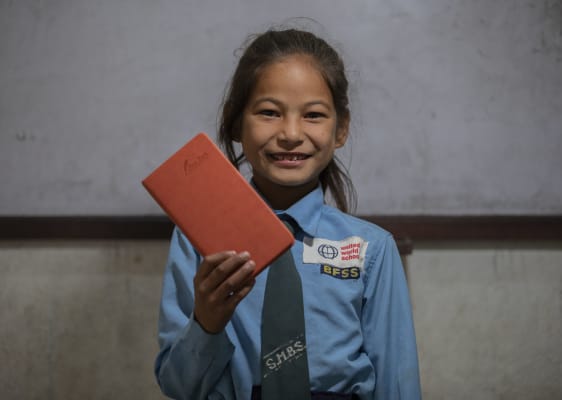
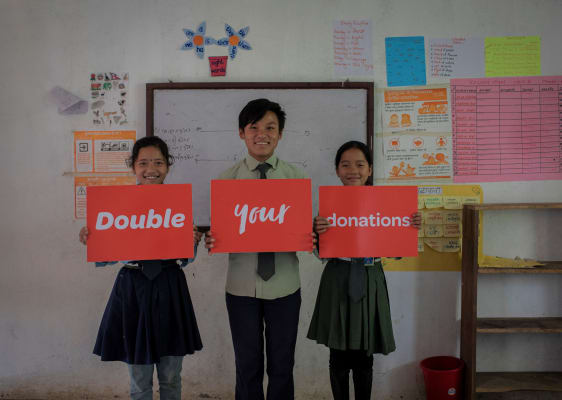
“I used to dream of going to school and now I can!”
- 11 year old Kanchi
“I learn a lot of new and interesting things everyday. My favourite subject is Maths and I feel great when I’m able to help my friends with their studies too. I don’t like to miss even a single day of school. One day I’d like to become a teacher – I want to earn a good living and give my grandmother a comfortable life.”
11 year old Kanchi (pictured), who attends UWS Helawubesi School in the Himalayan mountains of Nepal.
Between 29 April and 29 July 2021, for every £1 that was given to United World Schools by a UK donor, the UK government matched this by giving £1!
Donations will help us continue to reach thousands of underprivileged children like Kanchi with a transformative education across Asia.
Match funding from the UK government will be used to help 8,505 out-of-school children in some of the most remote areas in Nepal to go to primary school for the first time in their lives.
Together, with your donations and match funding from the UK government, we’re aiming to reach over 10,000 children with education, train and employ 375 teachers and build 70 new schools in Nepal and across Asia. With the pandemic exacerbating the education crisis and schools across Nepal closed, this is needed more than ever.
